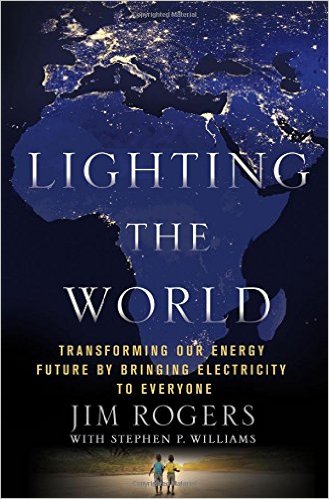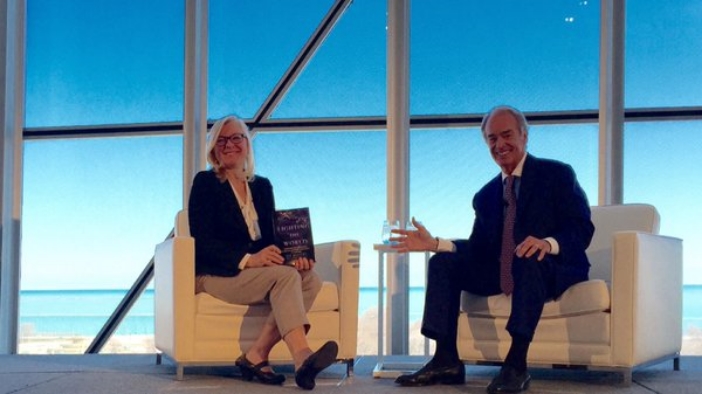
- Fourteen startups pitched; four ended up splitting eight grants worth a total of $1 million;
- Wells Fargo gives CET $1 million, in addition to separate $250K built environment grant;
- Optimistic keynote Jim Rogers, former energy CEO, says story-telling will enlighten world.

With natural disasters, violence, and political sniping reliably feeding our daily national news cycle, it is certainly easy to lose sight of all the light that is still fighting gamely against the vast, closing darkness.
Remove the metaphors, though, and you are left quite literally with the ongoing global struggle to bring electricity not just to the so-called Dark Continent, but to every corner of our crowded planet. Such seemingly grim work served as the inspiring cornerstone of the Sixth Annual Clean Energy Trust (CET) Challenge, held last week in Chicago. Students, mentors, judges, civic leaders, energy executives, and prospective investors, all pulsed with infectious excitement. As luncheon keynote, Jim Rogers, retired CEO of Duke Energy, said without hesitation, “I am very optimistic!”

Rogers actually made his comment in response to a question that I had posed during the Q&A portion of his refreshingly positive April 12 address to 300-plus stakeholders at the USGBC LEED Silver-certified Spertus Institute. I had asked: “In this prolonged political silly season, everyone here knows that we are facing so many serious issues in need of urgent action. How optimistic are you that we, as a nation, will really address them any time soon?”
Rogers said his optimism was grounded not in politics or government, but rather in the entrepreneurial spirit and market realities that he says are now finally driving real change. “Government policy didn’t put a nail in the coffin of the coal market; falling gas prices did,” he said, noting that the cost of both solar and wind energy generation also is dropping. “Every utility knows that by 2050, we will be leaving coal in the ground,” added Rogers. “This is one of the most interesting times to be part of the energy sector… We are on the edge of a huge transformation.”
“Science and data make people believe…
Stories make people care”
Since retiring in 2013, Rogers has been on a mission to help transform rural populations in low-income nations with access to clean, sustainable electricity. In fact, that is the driving premise of his new book Lighting the World, published last fall. He also teaches a graduate seminar at Duke University called Renewables and the Poor. (One of his students? BW contributor Andrew Seelaus!)
“I was the first CEO in the electric utility industry to speak about the changes needed in the face of climate change,” said Rogers, adding that he wrote the well-received book, “because science and data make people believe… Stories make people care.”
Power to the people
Rogers and the judges were particularly enthused about NovoMoto, a competing student startup from the University of Wisconsin-Madison. Its team ended up winning three of the eight total awards made at the CET Challenge, including the U.S. Dept. of Energy’s Cleantech University Prize for the Midwest Region. Describing itself as a “social enterprise”, NovoMoto aims to:
- …empower communities in Sub-Saharan Africa by providing renewable, sustainable electricity with its MicroPlant technology, particularly targeting the Democratic Republic of the Congo. In Congo today, 59 million people live without access to reliable grid electricity, using Kerosene to meet their lighting needs, which is an expensive lighting source for these communities and poses significant health and environmental risks. NovoMoto provides an affordable alternative to kerosene by incorporating solar power technology, control and monitoring software, and local partners to deliver reliable electricity to Congolese homes.
As winner of the Midwest Regionals, NovoMoto now joins Nelumbo, winner of the University of California-Berkeley Cleantech University Prize, and DR-Advisor, winner of the Allegheny Region Cleantech University Prize. All three have qualified for the Energy Dept.’s Cleantech University Prize National Competition in Denver this June, where $100,000 will be the grand prize.
Regional launch pad
In all, 14 Midwest cleantech startups this year competed for a combined $1 million in early stage investment funding at the CET Challenge. “The group of finalists participating in our accelerator program this year is testament to the advanced level of innovation happening in the cleantech space,” said Erik Birkerts, CEO of Clean Energy Trust. “[We are] proud to serve as a launch pad for companies that are leveraging science, innovation and technology to create a cleaner and more sustainable energy future.”
Below, this year’s full list of winners. Click on the respective links for individual details:
- Hazel Technologies|Evanston IL : Illinois Clean Energy Fund Award, $500,000
- Nexmatix | St. Louis MO : Wells Fargo Award, $240,000
- SPLT | Detroit MI : Pritzker Foundation Award, $100,000
- NovoMoto|Madison WI : U.S. DOE Cleantech University Prize Student Award, $50,000
- Nexmatix | St. Louis MO : United Airlines and Boeing Sustainable Energy Award, $45,000
- Nexmatix | St. Louis MO : ComEd Female CEO Award, $25,000
- NovoMoto| Madison WI : Power Clean Cities Award, $20,000
- NovoMoto| Madison WI : Hanley Family Foundation Award, $20,000
Those on hand also saw CET gather its own $1-million prize in the form of an oversized check made out to the nonprofit by Wells Fargo & Co.
“Among banks, Wells Fargo has far and away been the leader in supporting energy innovation,” said CEO Birkerts. The San Francisco-based banking giant separated itself from the financial field in late 2014 when it started the Wells Fargo Innovation Incubator, a five-year, $10-million program to help accelerate creative environmental technologies. The fund is co-administered by the U.S. Dept. of Energy’s National Renewable Energy Laboratory (NREL).
“As one of the world’s largest financial institutions, we have the responsibility and the means to foster and inspire innovation to find solutions that drive economic development, build more sustainable communities, and conserve and protect natural resources and our environment,” explained Wells Fargo VP Ashley Grosh, the bank’s Denver-based Business Initiatives Manager for Environmental Affairs. (Grosh also narrates the video below.)
The program is part of Wells Fargo’s 2020 Environmental Commitment to provide $100 million to environmentally-focused nonprofits and universities. The goal is to create an ecosystem that fosters and accelerates the commercialization of promising commercial buildings technologies that can provide scalable solutions to reduce the energy impact of buildings.
- NOTE: On April 14, Wells Fargo reported 1Q earnings of $5.5 billion. So, it would seem a safe bet to expect even more innovative investments in the not-too-distant future.
__________________________________________________________________________________
Since 2011, CET has invested in 29 startups across the Midwest. Clean Energy Trust Challenge companies have gone on to raise an additional $86 million in follow-on funding and have created more than 300 new jobs. The Challenge has jumpstarted more than 80 startups in the Midwest to date, including Detroit’s GreenLancer, and Chicago’s NETenergy and LuminAID.

Discussion
Be the first to leave a comment.
You must be a member of the BuiltWorlds community to join the discussion.